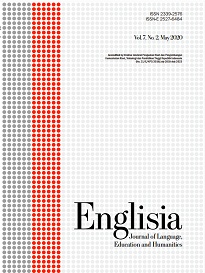Micro-teaching course: Does it affect students' teaching ability?
DOI:
https://doi.org/10.22373/ej.v7i2.6712Keywords:
micro-teaching course, pre-service teaching, teaching instruction, students’ teaching abilityAbstract
This explanatory quantitative study aimed to identify the correlation between the students’ Micro Teaching and Field Pre-Service Teaching courses. The population of the study was the students of the English Education Department of the Faculty of Education and Teacher Training Universitas Islam Negeri (UIN) Ar-Raniry, Banda Aceh, Aceh, Indonesia who had taken the micro-teaching class and had conducted field pre-service teaching, a total of 141 students. Then, 43 students were selected as the sample of this study. Data came from these students’ scores in Micro Teaching class and Field Pre-Service Teaching. The data were analyzed by using Pearson Product Moment with the SPSS 16.0. The findings indicated that there was no significant correlation between micro-teaching and field pre-service teaching (p-value = .196; p>.05). In addition, the strength level of the Pearson correlation coefficient between the two variables was negative and weak (r = -0.201). It can be interpreted that the students’ teaching ability was not dependent upon their micro-teaching scores.
Downloads
References
Advisory Committee on Teachers Education and Qualification. (2013). The instructor advantage framework and the persevering with professional development of teachers. UK. Retrieved from: https://www.info.gov.hk/gia/general/201305/15/P201305150446.htm
Asmani, J. M. (2010). Microteaching and crew teaching. Yogyakarta, Indonesia: DIVA Press.
Barizi, A., & Idris. M. (2009). Menjadi guru unggul. Jogjakarta, Indonesia: ArRuzz Media
Benitez, J., Henseler, J., Castillo, A., & Schuberth, F. (2020). How to perform and report an impactful analysis using partial least squares: Guidelines for confirmatory and explanatory IS research. Information & Management, 57, 1-16.
Coolidge, F.L. (2012). Statistics: A gentle introduction. Thousand Oaks, CA: Sage Publications.
Cooper, J. M., & Allen, D. W. (1970). Microteaching: history and present status. Washington, D.C: ERIC Clearing House on Teacher Education.
Creswell, J. W. (2012). Educational research: Planning, conducting and evaluating quantitative and qualitative research (4th ed.). New York, NY: Pearson.
Damrow, A. L., & Sweeney, J. S. (2019). Beyond the bubble: Preparing pre-service teachers through dialogue across distance and difference. Teaching and Teacher Education, 80, 255–265.
Hamalik, O. (2009). Proses belajar mengajar. Jakarta, Indonesia: PT. Buma Aksara.
Hasibuan, J. J., & Moedjiono. (2010). Ketrampilan dasar mengajar guru dan dosen. Jakarta, Indonesia: Grafindo.
Hatch, E. M., & Farhady, H. (1982). Research design and statistics for applied linguistics. Rowley, MA: Newbury House.
Hirshberg, M. J., Flook, L., Enright, R. D., & Davidson, R. J. (2020). Integrating mindfulness and connection practices into pre-service teacher education improves classroom practices. Learning and Instruction, 66, 1-11.
Kılıç, A. (2010). Learner-centered micro teaching in teacher education. International Journal of Instruction, 3(1), 77-100.
Kumari, B. V. & Rao, D. G. B. (2004). Methods of teaching social studies. New Delhi, India: Dynamic Printer Delhi.
Kyriacou, C. (2009). Effective teaching in schools: Theory and practice (3rd ed.). Cheltenham, UK: Nelson Thornes Ltd.
Lynch, M. (2016, September 2). For pre-service teachers: the eight goals every field experience should achieve. The Edvocate. Retrieved from https://www.theedadvocate.org/pre-service-teachers-eight-goals-every-field-experience-achieve/
Mahmud, I. & Rawshon, S. (2013). Microteaching to improve teaching method: An analysis on Students' perspectives. IOSR Journal of Research & Method in Education, 1(4), 69-76.
Meutia, P. D., Elyza, F., & Yusnila, Y. (2018). Pre-service teachers’ performance post microteaching class in field experience program. Englisia: Journal of Language, Education, and Humanities, 5(2), 102-114.
Morse, B. J., & Popovich, P. M. (2009). Realistic recruitment practices in organizations: The potential benefits of generalized expectancy calibration. Human Resource Management Review, 19(1), 1–8.
Najjah, W. I. S (2014). Pengaruh nilai micro teaching terhadap kemampuan mengajar praktek pengalaman lapangan (PPL) mahasiswa S1 program studi Tadris Biologi Angkatan 2010 Fakultas Ilmu Tarbiyah dan Keguruan IAIN Walisongo Semarang. (Bachelor's thesis), IAIN Walisongo, Semarang, Indonesia.
Parkay, F. W., & Standord, B. H. (2011). Becoming a teacher: Student value edition (8th ed). London, UK: Pearson.
Remesh, A. (2013). Microteaching, an environment friendly method for getting to know effective teaching. Journal of Research in Medical Sciences, 18(2), 158–163.
Saban, A., & Coklar, A. N. (2013). Pre-service micro-teaching approach in teaching practice classes. The Turkish Online Journal of Educational Technology, 12(2), 234-240.
Vagi, R., Pivovarova, M., & Barnard, W. (2019). Dynamics of pre-service teacher quality. Teaching and Teacher Education, 85, 13–23
Volet, S., Jones, C., & Vauras, M. (2019). Attitude-, group- and activity-related differences in the quality of pre-service teacher students’ engagement in collaborative science learning. Learning and Individual Differences, 73, 79–91.
Widiarini, I. A. K., Tripalupi, L. E., & Meitriana, M.A. (2015). Hubungan hasil belajar mata kuliah Micro Teaching (PPL I) dengan hasil belajar Program Pengalaman Lapangan (PPL II) mahasiswa Jurusan Pendidikan Ekonomi pada semester genap tahun akademik 2013/2014 dan semester ganjil tahun akademik 2014/2015. Jurnal Jurusan Pendidikan Ekonomi Undiksha, 5(1).
Widiastuti, A. (2011). Faktor-faktor yang mempengaruhi kompetensi guru IPS SMP di Kabupaten Sleman. (Master’s thesis), Universitas Negeri Yogyakarta, Yogyakarta, Indonesia.
Downloads
Published
Issue
Section
License
Proposed Policy for Journals That Offer Open Access
Authors who publish with Englisia journal agree to the following terms:
- Authors retain copyright and grant the journal right of first publication with the work simultaneously licensed under a Creative Commons Attribution License that allows others to share the work with an acknowledgement of the work's authorship and initial publication in this journal.
- Authors are able to enter into separate, additional contractual arrangements for the non-exclusive distribution of the journal's published version of the work (e.g., post it to an institutional repository or publish it in a book), with an acknowledgement of its initial publication in this journal.
- Authors are permitted and encouraged to post their work online (e.g., in institutional repositories or on their website) prior to and during the submission process, as it can lead to productive exchanges, as well as earlier and greater citation of published work (See The Effect of Open Access).









